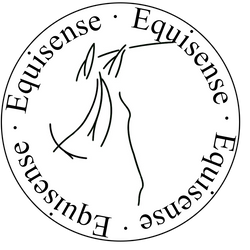So you may wonder, why a chapter on the history of the equine development? We all know they are grass eating animals that lives in herds, always have been! Right?
The horses are indeed herd animals, and on top of that they are steppe animals. Steppes are large areas with grass, "poor" grass to our standard. This means that horses have developed to survive on a relatively poor diet. To do this they must eat a lot to get all the nutrients they need. And how do these large groups of animals manage to accquire such a large amount of food? Well, they have a huge amount of land to travel across, and they do! Relatively slowly of course, walking and eating, jogging a little.... Really, the only need for a higher gear (canter/gallop) is to get away from something that is threatening to eat them. In between their eating and travelling, and don't forget resting, time, there is time only for socialising. The horses may have a scratch with a friend, or swish each others flies away. Most interaction is done on a need-to-do basis, which is not to say the horses don't enjoy it. They commmunicate constantly with each other, by signs that unfortunately not many people even notice. A look can be enough to send a lower ranked horse a few steps further away, paired with an ear movement or a swish of the tail. The need to stay in a group is based on "safety in numbers", the more individuals the more chance of spotting a predator. Although the horses are large animals, they have very few parts that can damage a predator. Sure, the hooves are hard, but they were made for running, not fighting. They have no claws or sharp teeth, they are not particularly agile if you compare them to cat-animals and others that hunt them. Their defence is to run away, and only turn to defence when they have been trapped (almost only exception being to defend a foal).
Naturally horses:
graze almost constantly to get the nutrition required for survival
live in groups to be safe
interact continously
slowly move themselves over large areas
use flight before fight
How is this different to how we keep horses in the modern day?
Most horses nowadays are kept stabled. And we keep them separated from each other for protection, so they don't hurt each other. As times have moved on we have developed different ways to feed our horses, since we cant very well keep the amount of land required for these large animals to survive on. Plus, they probably would survive on that alone, the climate all over the world is different. As money has become more readily available we have come up with simpler solutions to give horses the nutrients they need (or not need???). This is also required because we work them.
In capture horses:
eat small concentrated meals
live in individual stables
interact sporadically, perhaps in the paddock
work hard for an hour or two per day
are misunderstood and are forced to fight to defend themselves as they are trapped
OH MY HORSE, how can you generalize like that??!??
Well, it is indeed a generalization. It obviously does not apply to everyone. However, at least parts, if not alll, apply to every single one of my cliients. This in not due to to malicious nature, quite the opposite, but also to lack of knowledge. I will honestly say that i believe you can keep a very happy and healthy horses under these premises, but you do have to be wise, and a little cunning perhaps.
Why does it matter anyway? Surely horses have developed to cope with the human way by now, they have been living in capture for... well, a long time anyway!
Unfortunately nature does not develop as quickly as human ideas. And how long horses have been domesticated is not necessarily relevant, depending on what we are talking about. For example, they have gotten used to eating dried grass (hay) instead of fresh grass. The horse has been domesticated for around 4000 years. Imagine how slow this change was introduced. The horse naturally would eat some dry old grass anyway, but going from that to the green rich stuff we feed today has been a long process. And lets remember that it is not over 4000 years that we have introduced haylage or hard feed....
I will (attempt) to explain a few of the issues people have created regarding horses. Do not in any way think I am telling you not to keep horses, I am simply trying to spread information of the equines natural habitat and how to try to make these fantastic animals happy in the less than ideal situations we put them in.
During the process of making this website I have sourced information from my excellent mind with its background in the field and EDUCATION!
Copyright @ All Rights Reserved
